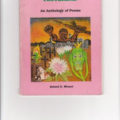A LITTLE GIRL LOST
Children of the future age,
Reading this indignant page,
Know that in a former time
Love, sweet love, was thought a crime.
In the age of gold,
Free from winter’s cold,
Youth and maiden bright,
To the holy light,
Naked in the sunny beams delight.
Once a youthful pair,
Filled with softest care,
Met in garden bright
Where the holy light
Had just removed the curtains of the night.
There, in rising day,
On the grass they play;
Parents were afar,
Strangers came not near,
And the maiden soon forgot her fear.
Tired with kisses sweet,
They agree to meet
When the silent sleep
Waves o’er heaven’s deep,
And the weary tired wanderers weep.
To her father white
Came the maiden bright;
But his loving look,
Like the holy book,
All her tender limbs with terror shook.
Ona, pale and weak,
To thy father speak!
O the trembling fear!
O the dismal care
That shakes the blossoms of my hoary hair!’
A DIVINE IMAGE
Cruelty has a human heart,
And Jealousy a human face;
Terror the human form divine,
And Secrecy the human dress.
The human dress is forgèd iron,
The human form a fiery forge,
The human face a furnace sealed,
The human heart its hungry gorge.
A CRADLE SONG
Sleep, sleep, beauty bright,
Dreaming in the joys of night;
Sleep, sleep; in thy sleep
Little sorrows sit and weep.
Sweet babe, in thy face
Soft desires I can trace,
Secret joys and secret smiles,
Little pretty infant wiles.
As thy softest limbs I feel,
Smiles as of the morning steal
O’er thy cheek, and o’er thy breast
Where thy little heart doth rest.
O the cunning wiles that creep
In thy little heart asleep!
When thy little heart doth wake,
Then the dreadful light shall break.
THE SCHOOLBOY
I love to rise in a summer morn,
When the birds sing on every tree;
The distant huntsman winds his horn,
And the skylark sings with me:
O what sweet company!
But to go to school in a summer morn,—
O it drives all joy away!
Under a cruel eye outworn,
The little ones spend the day
In sighing and dismay.
Ah then at times I drooping sit,
And spend many an anxious hour;
Nor in my book can I take delight,
Nor sit in learning’s bower,
Worn through with the dreary shower.
How can the bird that is born for joy
Sit in a cage and sing?
How can a child, when fears annoy,
But droop his tender wing,
And forget his youthful spring!
O father and mother if buds are nipped,
And blossoms blown away;
And if the tender plants are stripped
Of their joy in the springing day,
By sorrow and care’s dismay,—
How shall the summer arise in joy,
Or the summer fruits appear?
Or how shall we gather what griefs destroy,
Or bless the mellowing year,
When the blasts of winter appear?
TO TIRZAH
Whate’er is born of mortal birth
Must be consumèd with the earth,
To rise from generation free:
Then what have I to do with thee?
The sexes sprung from shame and pride,
Blowed in the morn, in evening died;
But mercy changed death into sleep;
The sexes rose to work and weep.
Thou, mother of my mortal part,
With cruelty didst mould my heart,
And with false self-deceiving tears
Didst blind my nostrils, eyes, and ears,
Didst close my tongue in senseless clay,
And me to mortal life betray.
The death of Jesus set me free:
Then what have I to do with thee?
THE VOICE OF THE ANCIENT BARD
Youth of delight! come hither
And see the opening morn,
Image of Truth new-born.
Doubt is fled, and clouds of reason,
Dark disputes and artful teazing.
Folly is an endless maze;
Tangled roots perplex her ways;
How many have fallen there!
They stumble all night over bones of the dead;
And feel—they know not what but care;
And wish to lead others, when they should be led.


